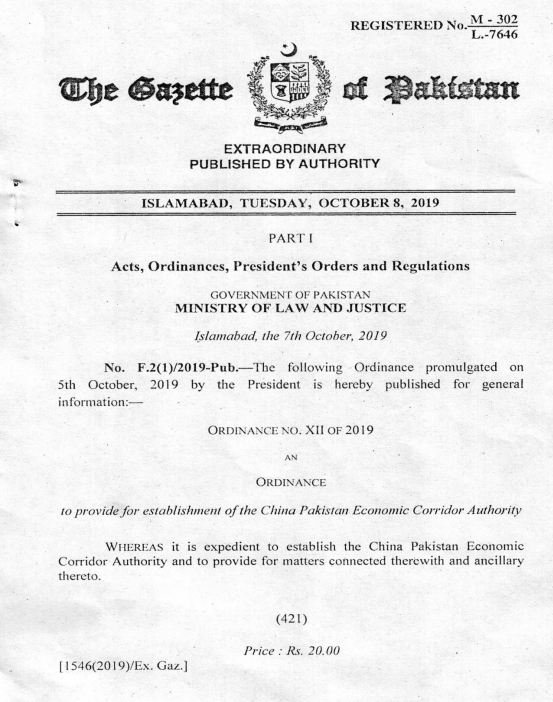Chinese Debt Trap Diplomacy as part of Chinese Economic Imperialism
Chinese Debt Trap Diplomacy is used by Imperialist China to control the world. Many countries around the world that voluntarily or involuntarily fell into the Chinese debt trap, are following the orders of Communist CCP China. Recent 2 ordinances signed by President of Pakistan has tightened the Chinese Noose around Naya Pakistan’s already fragile neck.

The world’s focus on Soviet Russia and ignorance of China was fully used by China to an extent that but it’s not a fair enough game. Chinese economic policy was simple – create a manufacture based ecosystem guaranteeing the lowest manufacturing cost in the world, part of it arising from slave labour camps and part of it due to the export subsidies China provides to it’s exporters.
For the manufacture industry China built, China needs a market to sell – countries which are economically backward, governments which are corrupt and countries which perceive themselves to be vulnerable and wanted allies. There are some cases, though, where the governments wanted to genuinely help their citizens but were caught in the Chinese debt trap.
Xi Jinping’s Imperialistic ambition and hunger for power has sidelined the democratic institutions, elected representatives, constitutional bodies in every country China has stepped in. As mentioned above, Chinese Communist CCP has done this to expand its direct influence over the political and economic processes in the countries.
In our previous article Chinese Debt Trap Diplomacy: Chinese Imperialistic Prescription For The World we covered about the Chinese Debt Trap Diplomacy to take over the entire world.
In another another previous article Chinese Debt Trap Diplomacy – The African Modus Operandi we covered, how China has used Debt Trap Diplomacy to Gain control in African Continent.
In another previous Article Chinese Debt Trap Diplomacy in Africa : The Case of Ghana – A Report we covered in details the case of Ghana, and how China is exploiting the natural resources and destroying the environment especially the land and the water resources that are the lifeline of millions of people of Ghana.
Noose Around The Neck of Naya Pakistan?
Pakistan is a classic example of a failed country. The corrupt polity and army needed to run it’s anti-Indian agenda even if it is at the expense of Pakistan and in the recent years, China has become the milch cow for Pakistani Army to spread it’s nefarious agenda. With matching interests over India, it is but natural that China will embrace Pakistan with open arms, but on it’s own terms. As like with every other country, China is slowly poisoning Pakistan by creating extreme shortages of foreign-exchange reserves. In the end, these countries will have to accept the invasion of their political and economic systems by the Communist Party of China. Two statements actually spell out the trouble which Pakistan is in – An adage which goes in Indian official circles goes like this – China will fight India till the last Pakistani.
The word New Xinjiang is fast catching up these days. Xinjiang literally translates to New Province and by calling Pakistan as New Xinjiang, China is not looking at Pakistan as a sovereign entity but as a province of China itself.
Four months ago, an inquiry into the workings of independent power producers (IPPs) took place in which two major coal-fired power-plant projects that were built under the CPEC – Huaneng Shandong Ruyi Energy and Port Qasim Electric Power Company – were found involved in corruption as they had misrepresented interest during construction to loot almost US$226 million from the dollar-strapped Pakistani economy.
Since 2016, Xi, the general secretary of the Communist Party of China has been forcing the Pakistani establishment to put pressure on the government (it was Nawaz Sharif’s government back then) to sideline the Planning Ministry’s role in the implementation and monitoring of the multi-billion-dollar China-Pakistan Economic Corridor (CPEC).
Xi pushed for the creation of a supra-constitutional CPEC Authority that would freelance the management of the predatory infrastructure and power-generation projects under his direct command. The supra-constitutional CPEC Authority will act as the CPC’s subsidiary in Pakistan and will be responsible for conceiving, implementing, expanding, enforcing, controlling, regulating, coordinating, monitoring, evaluating and carrying out all activities related to the CPEC.
The proposal was rejected then by Nawaz Sharif Government, but last year it was again presented before the prime minister of the country – now Imran Khan. The reason given was timely completion of the projects.
2 New Ordinances passed by Pakistan under cover that would shake Imran Khan Government to sell off Pakistan to China
Away from the public knowledge Pakistan Government headed by Imran Khan recently passed 2 New Ordinances, that was like selling off Pakistan to the Chinese Han Masters.
In a report titled Towards a Leviathan? The Establishment of a new Authority for the CPEC (PDF Download in Hyperlink), Dr Siegfried O. Wolf brought to attention these two little known Ordinances.
He writes, “In the shadow of the latest plenary session of the Financial Action Task Force (FATF), the current government of Prime Minister (PM) Imran Khan pushed the promulgation of two ordinances: ‘The CPEC Authority Ordinance, 2019’ and ‘The Tax Laws (Amendment) Ordinance, 2019’. Distracted by the FATF process (Pakistan once more managed not to become blacklisted by the global watchdog for terror financing), most international observers – especially western observers – failed to notice this political manoeuvre. Yet these two new ordinances have far reaching consequences, not only for the country’s economic development but also for its political trajectories.”
The Tax Laws (Amendment) Ordinance, 2019 – 23-year tax holiday for the Chinese Overseas Port Holding Company (COPHC)
To begin with, one should have a closer look at these two regulations: ‘The Tax Laws (Amendment) Ordinance, 2019’ intends to give tax concessions to the Gwadar port and its free zone. More concretely, this law implements a 23-year tax holiday for the Chinese Overseas Port Holding Company (COPHC) operating the Gwadar port, as well as benefits other Chinese companies conducting business (or planning to do so) in the city. In other words, the Pakistani authorities are renouncing – or donating – much tax revenue from the Gwadar port itself and other related potential sources of income (such as the Airport and Special Economic Zone/SEZ).
The 23-year tax holiday for Chinese Overseas Port Holding Company (COPHC) and other Chinese companies, conducting business (or planning to do so), is meant to provide an incentive to continue working in Gwadar. In the agreement, COPHC will get 91% and the government of Pakistan will get 9% of profits from the operations of Gwadar port. The decision to grant a 23-year tax holiday means the federal government of Pakistan has given up tax revenue from operations at Gwadar port.
It is a similar tactic of the Chinese where they make the host country believe that Chinese are doing a favor. It is as if, Chinese are doing favor and showing their kindness by giving alms to the beggar Pakistan by setting projects in which Chinese Engineers and workers will be brought and the Chinese material will be used. There are no provisions of road side restaurants (Dhaba) on the CPEC. Only at regular intervals, puncture shops may be opened to give employment to local Pakistanis that are close to Pakistan Army, Pakistan Government and politicians.
Same sentiments are echoed by all natives of Pakistan across different regions. Here are a few comments made by Pakistanis on social media platform Twitter:-
CPEC Authority Ordinance, 2019 – establishment of the supra-constitutional China-Pakistan Economic Corridor Authority (CPECA)
The ‘CPEC Authority Ordinance, 2019’ aims at the establishment of the supra-constitutional ‘China-Pakistan Economic Corridor Authority (CPECA)’. This new apex institution for the CPEC will be entrusted with not only far reaching autonomy but also vast financial and administrative powers. This authority would freelance the management of the predatory infrastructure and power-generation projects under his direct command.

Both the CPECA and the tax concessions related to the Gwadar port were approved by the National Development Council (NDC), a new body formed in June, 2019, entrusted with the superficial tasks of setting policies and strategies for development and ‘formulate and tailor policies to achieve accelerated economic growth’. Furthermore, the NDC is supposedly responsible for approving long-term planning in relation to national and regional connectivity. It is interesting to note that, by including the Chief of the Army Staff/COAS, the NDC became in fact yet another civilian-military hybrid institution – giving the armed forces another level-playing field in influencing crucial decision-making in Pakistan. Since the Authority has come into existence, its chairman has been a retired lieutenant-general.
With the unstable successive puppet governments at the Center in Pakistan, China wanted direct influence over the political and economic processes of the country. The demand for the establishment of a central CPEC institution with full authority over all corridor projects within Pakistan is not new – it is certainly not an idea created by PM Imran Khan and his administration. For a couple of years now an increasing number of reports have revealed that the civilian institutions responsible for the CPEC’s implementation are understaffed and overwhelmed, facing manifold difficulties such as lack of experience and subsequent ineffective project management, which in turn leads to delays and other hurdles in realizing projects. In fact, the demand to create a new ‘CPEC authority’ is strongly advocated by the Chinese, Pakistan military and related circles. Against this backdrop, the following statements can be made regarding the establishment of the CPECA:
Acting on orders of his Masters in China, Lieutenant General (R) Naeem Khalid Lodhi proposed the creation of a ‘powerful and competent coordination body for overseeing the project and underscored the need to protect Pakistan’s interests in the project while keeping it safe from external threats’. A new ‘CPEC authority’ would serve several functions, particularly consensus-building between the federal government and provinces, inter-agency coordination, capacity building, and project facilitation. In this context, it is of utmost importance to stress that the then civilian administration of PM Nawaz Sharif clearly rejected such proposals. One of the major reasons for that attitude was that civilians identified the establishment of a central CPEC body as an additional venue for the military to gain increased leverage within and control over CPEC-related decision-making.
It seems that under the selected PM Imran Khan, the approach regarding the notion of establishing an apex body for the CPEC changed fundamentally in favor of military interests. Besides this, the question turns up – why now? It appears that the aim of the current Imran Khan government is not only to appease the military but also to reduce Chinese unease over the low pace of the CPEC’s implementation and other trends. In fact nothing is in hands of Pakistan as everything is being done by the Chinese. As a pressure tactics, China occasionally stops CPEC funding to force Pakistan Government (that is already heavily indebted and on the verge of collapse) to promulgate such Ordinances whose drafts are prepared by the Communist CPEC and the print versions are signed by the rubber stamp President without the knowledge and scrutiny of parliamentarians. These were definitely two determining factors in the decision to set up the ‘CPEC Authority’. As such, it does not come by surprise that the decision on the CPECA was pushed through on the eve of Imran Khan’s visit to Beijing. It is also no surprise that PM Khan was accompanied by the COAS during his visit to China.
Related Article : Naya Pakistan: A Vision OR A Delusion
However, it is wishfully dreamed by Pakistan Government that the CPECA will remove major bottlenecks in the implementation of the corridor between China and Pakistan as well as boost the country’s capacity to gain more benefits from this development scheme, like encompassing an increase in overall exports, reduction of trade deficit with China, and improving the competitiveness of domestic companies.
However, the reality is that Pakistan Army that owns all the businesses in Pakistan under the banner of Fauji Foundation and allied Organisations, has big stakes in CPEC projects. Pakistan Army does not want to leave CPEC decision making at the hands of the democratically elected and constitutional bodies that Pakistan Army considers as incompetent and may question the loot of Pakistan resources by China and the Fauji Foundation circles.
Related Article : Fauji Foundation of Pakistan looting Pakistani Tax Payers Money
Firstly, according to critics, the two new ordinances are making the whole CPEC project more controversial and will stir further grievances among the domestic opposition which is growing against this development initiative. It is reported that the main opposition parties are not against the idea of an overall coordinating institution for the CPEC a priori. Yet they reject the government’s decision to establish the CPECA through a presidential ordinance – bypassing both the National Assembly and the Senate. This is perceived by the parliamentary opposition as ‘backdoor legislation’ and as such an ‘illegal move’ and a ‘violation of parliament`. The fact that the current government is doubtlessly aware about the critical view by some legislators and senators – and taking into account that it ‘lacks numerical strength in Senate’– makes the issue politically charged. In sum, the way PM Imran Khan is establishing the CPECA can be described as a truncation of democratic processes.
Secondly, due this ‘side-stepping of the parliament’ (a term used by former federal minister Ahsan Iqbal, one must state that the new authority will drag the CPEC even deeper into the already existing ‘legal limbo’. More concretely, since the most essential part of the CPEC is partly constructed on disputed territory (namely the area of Gilgit-Baltistan which constitutes the only land connection between Pakistan and China and in the occupied territories of Balochistan and Sindhudesh that would soon break away from Pakistan), the corridor stands on a legally weak ground to say the least. A central institution created by presidential ordinance and not through a decision by the parliament makes the legal and constitutional status of its ‘authority’ shaky.
What happens if Freedom Fighters carry out their struggle and ban Pakistan from accessing the ports in the occupied nations of Sindhudesh and Balohistan? Check this previous article Punjab Blocks Sindh’s Water, Sindh Blocks Ports for Punjab: Sindhudesh Freedom Fighters wherein Pakistan has already been warned by Sindhudesh Freedom Fighters.
Also check another Related Article Balochistan Commemorates 2019 Gwadar Attack
According to experts, the breeding fault line is that ’The CPEC Authority Ordinance, 2019’ needs to be either ratified by the parliament or extended by the President before the lapse of 120 days. Of course, there is the option of extending the ordinance a number of times but this would further undermine trust in civilian institutions. The CPEC Authority was established in October last year using a presidential ordinance (without parliament’s approval) for four months and then was given another four-month extension. Now second extension of 120 days is also going to be over. However, Xi wants permanent control. And now that the Pakistan establishment has its puppet in the Prime Minister’s House, it is putting all of its efforts into making the Authority more powerful and a permanent part of the constitution by pushing it through parliament. It needs to be seen how China makes Imran Khan to get it ratified by the Parliament or gets it extended by the rubber stamp President.
Thirdly, being established in Islamabad, the CPECA will lead to a further centralization of decision making in Pakistan. Only the PM (and its government) appoints CPECA members as well as the employees and officers working on the individual projects. Furthermore, the CPECA is not only in control of political and strategic decision making but also of finance (e.g. possessing its own CPEC fund empowered with budget allocations) of the corridor. Moreover, since the mandate of the CPECA is nationwide (including areas under Pakistan’s administration), it will override the (already meagre) authority by provincial governments and lead to further side-lining of the regional and local stakeholders. Against this backdrop, Baloch Senator Kabir contends that the formation of the CPEC authority is an attempt by Islamabad to snatch power and control over resources from the provinces.
Related Article : Boycott Fauji Foundation Products : Sindhudesh Freedom Fighters
Fourthly, instead of improving transparency and accountability, one should expect the opposite. China does not want to be questioned on what they do under the garb of CPEC in Pakistan. The fact that the CPEC authority leadership will enjoy ‘complete immunity’ and subsequently ‘no case can be filed against them’ is worrisome. Also, the CPECA being only responsible to report directly to the PM – and there being no mechanism in place to ensure any kind of parliamentary oversight – makes the whole institution highly questionable. Moreover, the CPECA has the strong potential to function as a surveillance instrument. The new authority will be provided with sole and full control over the flow of all information as well as communicate information regarding CPEC projects. In consequence, the CPECA is legally entitled to undermine all CPEC critics and able to block all ‘external’ (non-partisan/third party) monitoring and evaluation.
Fifthly, as indicated above, China does not want to be dependent on the incompetent democratically elected successive governments in Pakistan. China knows Pakistan Army wields the real power in Pakistan. It becomes obvious that the CPECA will give the military more leverage and control in CPEC decision-making. Considering that the new body was initially initiated by the military-influenced NDC, and considering the ‘special relationship’ between the army’s top brass and both the current PM and President, we must expect that the country’s armed forces will ensure their interests via the ‘Authority’. This phenomenon is best expressed by the words of the Pakistan People’s Party’s (PPP) Secretary General Farhatullah Babar stating that it appears the government wants to ‘hand over the CPEC project to the military’.
Recommended Article : China Made A Bio-Weapons Testing Facility in Pakistan To Avoid Coronavirus like Spread in China In Future
Sixthly, Xi didn’t want the Belt and Road Initiative or any of its components to be held accountable or face resistance. He knows that his Chinese Dream of indoctrination of a majority of free people of the world by 2050 will not be fulfilled if the people of the countries victimized by the BRI come to know about his strategy to destroy their futures and those of their future generations. Xi did not want Pakistan’s political class or any other constitutional bodies to interfere in the working of CPEC Authority. It does not come by surprise that the new institution will most-likely add to the already existing transparency gap. It will also offer manifold opportunities for state-capture to Pakistan’s establishment, especially now for the military top brass, due to its centralised and exclusive nature. The fact that the CPECA stands free from any parliamentary oversight is not only a further weakening of the fragile civilian institutions but also makes sure that the CPEC decision-makers will be not held accountable for failures and aberrations. In consequence, witnessing the emergence of an omnipotent Leviathan for the CPEC, one needs to ask – ‘Who will guard the guardians’?
Furthermore, it will have the constitutional power to initiate an investigation and impose penalties against any public office holder (including the prime minister and president of Pakistan) or any other person who is directly or indirectly engaged in CPEC-related activities who willfully resist directions, instructions or specified orders of the CPEC Authority.
Related Article : Bhasha Dam in Occupied Gilgit-Baltistan: How will Bankrupt Pakistan Payback China?
Even the Prime Minister’s powers will be limited to what is specified in the CPEC Authority Bill 2020. So he too will have to obey Xi’s commands.
According to a news report (that soon after its publication was mysteriously taken down), the chairman of the Authority – who, as noted above, is a retired lieutenant-general – will co-chair the Joint Cooperation Committee as the democratically elected planning minister will be removed from this position.
The JCC is the main decision-making body of CPEC. It has members from both Pakistan and China. But every year the Chinese officials at the JCC meetings browbeat the Pakistani officials as they review the making of Xi’s version of the East India Company.
As the world moves toward 2050, Xi’s plan of China’s ultimate control of the majority of the emerging-market economies is becoming crystal clear. At the cost of its sovereignty, territorial integrity and freedom of its people, the “selected” government of Pakistan is finding a permanent place in Xi’s basket.
Today he will attempt coup against the Ministry of Planning; next in his playbook could be its Defense Ministry, IT Ministry, Human Rights Ministry, Petroleum Ministry and many more.
Points to Ponder
Is the Pakistan public aware of these 2 Ordinances and their implications on their future?
Does Pakistan Public know that already the interest burden is too high on Pakistan as a percent of their GDP, that any small event like a small military skirmish with India will cost Pakistan a lot and will give China an opportunity to take ownership of all the resources? Is that what China is pushing Pakistan towards?
China has given the false hope to Pakistani Military establishment and Radical Islamists in Pakistan that China can take down India. Rather than protecting interests of Pakistan, Pakistan’s policy is driven by hate for India. In that pursuit, is Pakistan ready to become New Xinjiang? Xinjiang literally translates to New Province and by calling Pakistan as New Xinjiang, China is not looking at Pakistan as a sovereign entity but as a province of China itself.
This is nothing but tightening of the Chinese Noose around Naya Pakistan’s already fragile neck.
Twitter Handle: @newscomworld
Instagram Handle: @newscomworld
Parler Handle: @newscommuniquecom
Subscribe our : YouTube Channel https://www.youtube.com/channel/UCnKJQ3gFsRVWpvdjnntQoAA
Like our Facebook Page https://m.facebook.com/News-Communiquecom-103788531007438/
3,129 total views








